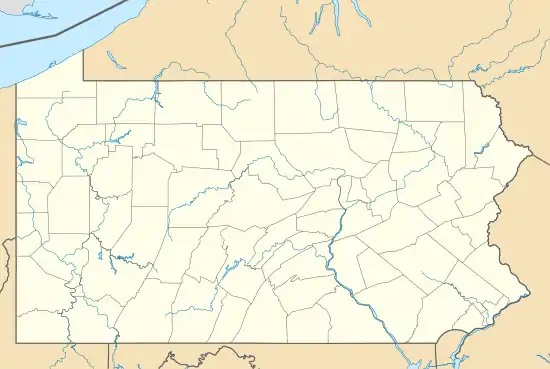Washington Run (Youghiogheny River tributary)
Washington Run is a 5.16 mi (8.30 km) long 2nd order tributary to the Youghiogheny River in Fayette County, Pennsylvania.
| Washington Run Tributary to Youghiogheny River | |
|---|---|
 Location of Washington Run mouth  Washington Run (Youghiogheny River tributary) (the United States) | |
| Location | |
| Country | United States |
| State | Pennsylvania |
| County | Fayette |
| Borough | Perryopolis |
| Physical characteristics | |
| Source | Crabapple Run divide |
| • location | about 1 mile west of Curfew, Pennsylvania[1] |
| • coordinates | 40°02′38″N 079°46′42″W[2] |
| • elevation | 1,080 ft (330 m)[1] |
| Mouth | Youghiogheny River |
• location | across the Youighiogheny River from Layton, Pennsylvania[3] |
• coordinates | 40°09′19″N 079°43′44″W[2] |
• elevation | 798 ft (243 m)[3] |
| Length | 5.16 mi (8.30 km)[4] |
| Basin size | 7.72 square miles (20.0 km2)[5] |
| Discharge | |
| • location | Youghiogheny River |
| • average | 10.28 cu ft/s (0.291 m3/s) at mouth with Youghiogheny River[5] |
| Basin features | |
| Progression | north and east[4] |
| River system | Monongahela River |
| Tributaries | |
| • left | unnamed tributaries |
| • right | unnamed tributaries |
| Bridges | Fayette City Road, Tony Row Road, Quaker Church Road (x2), PA 51, Liberty Street, Cemetery Road, Layton Road (x2) |
Course
Washington Run rises about 1 miles west of Curfew, Pennsylvania,[1] and then flows north and turns east to join the Youghiogheny River across from Layton.[3]
Watershed
Washington Run drains 7.72 square miles (20.0 km2) of area, receives about 41.9 in/year of precipitation, has a wetness index of 353.54, and is about 51% forested.[5]
References
- "Get Maps". USGS Topoview. US Geological Survey. Retrieved 21 November 2020.
- "GNIS Detail – Washington Run". geonames.usgs.gov. US Geological Survey. Retrieved 21 November 2020.
- "Get Maps". USGS Topoview. US Geological Survey. Retrieved 21 November 2020.
- "ArcGIS Web Application". epa.maps.arcgis.com. US EPA. Retrieved 21 November 2020.
- "Washington Run Watershed Report". US EPA Geoviewer. US EPA. Retrieved 21 November 2020.
This article is issued from Wikipedia. The text is licensed under Creative Commons - Attribution - Sharealike. Additional terms may apply for the media files.